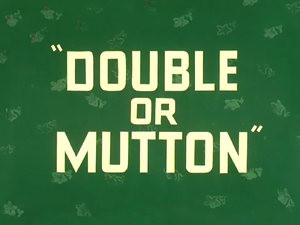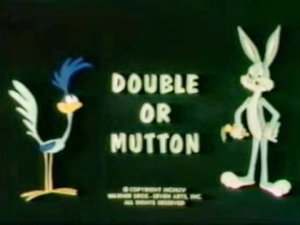Double or Mutton
From Looney Tunes Wiki
Jump to navigationJump to search
| Double or Mutton | |
|---|---|
| Production company | Warner Bros. Cartoons |
| Distributor | Warner Bros. Pictures The Vitaphone Corporation |
| Release date | July 23, 1955 |
| Starring | Mel Blanc |
| Producer(s) | Edward Selzer |
| Music composition | Milt Franklyn |
| Story | Michael Maltese |
| Animation | Richard Thompson Abe Levitow Keith Darling Ken Harris |
| Director(s) | Charles M. Jones |
| Series navigation | |
| ← Previous | Next → |
| Title card | |

| |
| Second title card | |

| |
Double or Mutton is a three hundred and forty-eighth Looney Tunes theatrical short. It was distributed by Warner Bros. Pictures and The Vitaphone Corporation on July 23, 1955. It was written by Michael Maltese, produced by Edward Selzer, and directed by Chuck Jones.
It's Ralph and Sam's first day on the job. However, part of Sam's job is to protect the sheep at the field, so he foils Ralph's many attempts to either steal a sheep or try to eliminate him.
Detailed summary
Memorable quotes
Sam: Morning, Ralph.
Ralph: Morning, Sam.
Sam: Good night, Ralph.
Ralph: See you tomorrow, Sam.
Characters
In order of appearance: | ||||||||||
| ||||||||||
Organizations
Locations
- Earth
- United States
- Sheep fields
- United States
Objects
- Punch clock
- Punch cards
- Rocket-guided lasso
- Little Bo Peep disguise
- Sheep costume
- Cannon
- Acme Hair Grower
Vehicles
- Helicopter with claw crane
Production
Development
Filming
Music
The music was composed by Milt Franklyn.
Crew credits
- Layouts: Philip DeGuard
- Backgrounds: Philip DeGuard
Release
Dates are in order of release:
- United States: July 23, 1954
Behind the scenes
- The title is a pun on the phrase "double or nothing", a gamble to decide wether a loss or debt should be doubled twice the amount.
- This is the first short where it is clearly established that Sam and Ralph are coworkers, as well as the first short where their names are consistent on their punch cards.
Errors
- The intro sequence incorrectly lists the production number as 1343, which is the production number for Sahara Hare, a cartoon produced earlier that year.
Home availibility
- In the United States:
- November 26, 2024: Warner Archive Collection releases Looney Tunes Collector's Choice: Volume 4 on Blu-ray Disc.